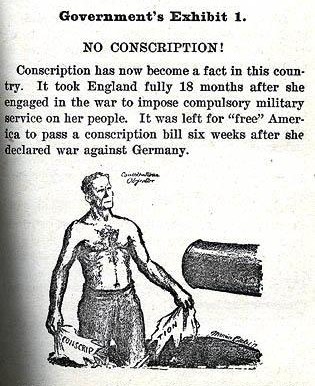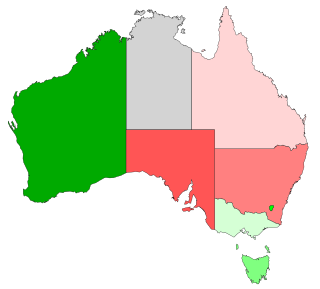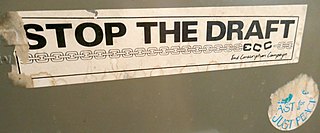
Conscription is the state-mandated enlistment of people in a national service, mainly a military service. Conscription dates back to antiquity and it continues in some countries to the present day under various names. The modern system of near-universal national conscription for young men dates to the French Revolution in the 1790s, where it became the basis of a very large and powerful military. Most European nations later copied the system in peacetime, so that men at a certain age would serve 1–8 years on active duty and then transfer to the reserve force.

Pacifism is the opposition or resistance to war, militarism or violence. The word pacifism was coined by the French peace campaigner Émile Arnaud and adopted by other peace activists at the tenth Universal Peace Congress in Glasgow in 1901. A related term is ahimsa, which is a core philosophy in Indian religions such as Hinduism, Buddhism, and Jainism. While modern connotations are recent, having been explicated since the 19th century, ancient references abound.

A conscientious objector is an "individual who has claimed the right to refuse to perform military service" on the grounds of freedom of thought, conscience, or religion. The term has also been extended to objecting to working for the military–industrial complex due to a crisis of conscience. In some countries, conscientious objectors are assigned to an alternative civilian service as a substitute for conscription or military service.

The No Conscription League was an anarchist organisation designed to promote anti-draft manifestos and aid those who refused military service. The league lasted for 6 weeks and was used to charge its founders Emma Goldman and Alexander Berkman with conspiracy to obstruct the draft.

Conscription in Australia, also known as National Service following the Second World War, has a controversial history in the country which dates back to the implementation of compulsory military training and service in the first years of nationhood. Military conscription for peacetime service was abolished in 1972.

The 1916 Australian referendum on compulsory military service was held on 28 October 1916. It was the first non-binding Australian referendum, and contained one question. This referendum was held due to Prime Minister Billy Hughes' desire to conscript young Australian men for overseas service during World War I. It was conducted under the Military Service Referendum Act 1916.

Emma Miller was an English-born Australian pioneer trade union organiser, suffragist, and key figure in organisations which led to the founding of the Australian Labor Party in Brisbane, Queensland, Australia.

Compulsory military training (CMT), a form of conscription, was practised for males in New Zealand between 1909 and 1972. Military training in New Zealand has been voluntary before then and ever since.

The Conscription Crisis of 1918 stemmed from a move by the British government to impose conscription in Ireland in April 1918 during the First World War. Vigorous opposition was led by trade unions, Irish nationalist parties and Roman Catholic bishops and priests. A conscription law was passed but was never put in effect; no one in Ireland was drafted into the British Army. The proposal and backlash galvanised support for political parties which advocated Irish separatism and influenced events in the lead-up to the Irish War of Independence.
Conscientious objection to military taxation (COMT) is a legal theory that attempts to extend into the realm of taxation the concessions to conscientious objectors that many governments allow in the case of conscription, thereby allowing conscientious objectors to insist that their tax payments not be spent for military purposes.

The End Conscription Campaign was an anti-apartheid organisation allied to the United Democratic Front and composed of conscientious objectors and their supporters in South Africa. It was formed in 1983 to oppose the conscription of all white South African men into military service in the South African Defence Force.
South African resistance to war has a long tradition, and a history that includes conscientious objectors, pacifists, deserters and draft dodgers, as well as those whose objections are based upon the notion of "just war" as opposed to unjust or illegal war.

Opposition to World War I was widespread during the conflict and included socialists, anarchists, syndicalists and Marxists as well as Christian pacifists, anti-colonial nationalists, feminists, intellectuals, and the working class.
During the second half of World War I, the First Australian Imperial Force experienced a shortage of men as the number of men volunteering to fight overseas declined and the casualty rate increased. At the time, military service within the Commonwealth of Australia and its territories was compulsory for Australian men, but that requirement did not extend to conflict outside of Australia. In 1916, Prime Minister Billy Hughes called a plebiscite to determine public support for extending conscription to include military service outside the Commonwealth for the duration of the war. The referendum, held on 28 October 1916, narrowly rejected the proposal. A second plebiscite, held a year later on 20 December 1917, also failed to gain a majority.

An anti-war movement is a social movement, usually in opposition to a particular nation's decision to start or carry on an armed conflict, unconditional of a maybe-existing just cause. The term anti-war can also refer to pacifism, which is the opposition to all use of military force during conflicts, or to anti-war books, paintings, and other works of art. Some activists distinguish between anti-war movements and peace movements. Anti-war activists work through protest and other grassroots means to attempt to pressure a government to put an end to a particular war or conflict or to prevent it in advance.
Kenneth Joseph Kenafick, also known by the pen names James Kennedy and Leo Conon, was an Australian poet, writer, translator and anti-conscription campaigner.
Margaret Sturge Thorp, also known as "The Peace Angel", was a peace activist and labour activist active in Australia in the 20th century. A Quaker, her religious beliefs guided her to a life of advocating for a variety of pacifist and feminist causes.

Cecilia Annie John was an Australian social activist, radical, and peace campaigner.
The No Conscription Campaign was an Australian campaign that started during World War I.









